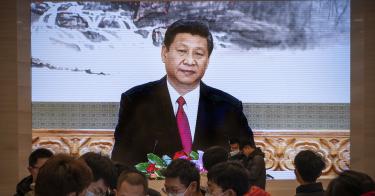Those in Washington wondering how long they will have to put up with Chinese President Xi Jinping and his hardline policies are about to get a hint that they probably won’t like.
The Chinese Communist Party (CCP) is holding its sixth plenary session of the 19th CCP Central Committee (Sixth Plenum) Nov. 8-11. On the agenda is a review of a historical resolution that is likely to further cement Xi’s hold on power and establish him as China’s paramount leader for years to come.
Plenary sessions are among the most underappreciated events in China’s political calendar. Officially, these gatherings are a venue for the roughly 200 most senior party officials to vote on proposals presented by the 25-member Politburo. In practice, however, they serve more to formalize decisions made ahead of the gathering through backroom meetings and negotiations.
>>> Hong Kong’s “Patriots Only” Election Will Further Erode Political and Civil Liberties
Historically, plenary sessions have been the settings in which some of China’s most consequential developments were announced. These include the rehabilitation of Deng Xiaoping and expulsion of the radical “Gang of Four” in 1977, the launch of Deng’s economic reforms in 1978 and the scrapping of presidential term limits in 2018.
This month’s plenum will occur roughly a year before the expected time of the 20th Party Congress, which will mark the end of Xi’s second term as the party’s head. In China’s standard seven-plenum cycle, the sixth plenum is often an important setting for pushing through big developments to set the stage for the main event. The outcomes of this plenum serve as barometers of how strong the paramount leader is ahead of the party congress.
The last sixth plenum, in 2016, saw Xi officially declared as the party’s “leadership core,” a title his immediate predecessor never received. In a political system where titles carry a lot of weight, this was a significant consolidation of power that foreshadowed the codification of “Xi Jinping Thought” in the CCP’s party charter during the party congress in 2017 and its subsequent enshrinement in China’s constitution, along with an amendment to eliminate presidential term limits.
This plenum will likely lay the foundation for what will come in the 20th Party Congress and provide considerable insight into Xi’s standing in the party and his role beyond 2022. Based on what we know about the plenum’s agenda, Xi is likely to emerge with a tighter grip on power than ever before.
The official announcement stated that, during the plenum, the Central Committee will review “a key resolution on the major achievements and historical experience of the Party's 100 years of endeavors.” As bland as this sounds, it’s a big deal.
Xi will be just the third Chinese leader to present a “historical resolution,” after Mao Zedong and Deng Xiaoping, both of whom used their resolutions, in 1945 and 1981 respectively, to consolidate their control over the CCP and set the party’s overall governance path for decades to come. The resolution will allow Xi to effectively rephrase Chines
>>> U.S. Must Prod China for More Freedom for Foreign Journalists
The resolution will also likely further entrench Xi’s controversial centralized governance style, as well as his more confrontational foreign policy. Just as Deng’s 1981 resolution repudiated Mao’s Cultural Revolution and formalized Deng’s economic reforms, Xi’s resolution will likely center on Xi Jinping Thought and provide insight into just how much he intends to roll back Deng’s reforms in the name of concepts such as “common prosperity.”
Indeed, what has been disclosed about the upcoming plenum leaves little doubt that Xi remains on the ascendency. While China’s lack of concrete regulations around leadership succession and the full year between the plenum and the expected date of the party congress make it premature to jump to conclusions, Xi does not appear likely to retire anytime soon. U.S. officials and policymakers should get used to the idea of continuing to deal with him for the foreseeable future.
This piece originally appeared in The Hill on 11/08/21



